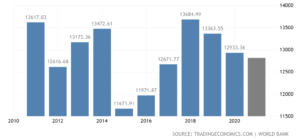Írta: John P. Mello Jr.
28. július 2021., 4:00 PT
Google on Tuesday announced a new service aimed at beefing up the search capabilities of retailers’ websites that may make those sellers more competitive with Amazon.
The service, Google Cloud Retail Search, hopes to address the staggering problem of “search abandonment,” which costs retailers more than $300 billion a year in the United States alone, according to research performed by The Harris Poll and commissioned by Google Cloud.
That research also found that 94 percent of consumers globally received irrelevant results while searching on a retailer’s website in the last six months, and 85 percent said they view a brand differently after experiencing search difficulties.
“The quality of search on most retailers’ websites can be greatly improved,” observed Srikanth Belwad, product manager at the Google Cloud Group.
“Search abandonment is even a larger problem than shopping cart abandonment,” he told the E-Commerce Times.
“The industry has traditionally focused on cart abandonment, but it has ignored all the things that happen before customers get to the cart,” he added.
Bailing On Search
Consumers abandon search when they simply can’t find what they’re looking for and either assume that a retailer doesn’t have what they need or just get frustrated and give up, explained Connor Folley, vice president of Jungle Scout, szoftvercsomag gyártója az Amazon eladói számára, Austinban, Texasban.
“If customers can’t find what they are looking for they are less likely to convert and less likely to return,” he told the E-Commerce Times, “so reliable and effective search increases revenues and lifetime value.”
Charles King, a cég vezető elemzője Tudós, a technology advisory firm in
Hayward, Calif. likened search abandonment to window shopping. “An opportunity seems to present itself but concludes without a sale,” he told the E-Commerce Times.
“Retailers would obviously like to reverse that,” he said. “More accurate search results could help change those outcomes.
“Overall retailer web design may be a problem too, not just poor site search,” added Greg Sterling, vice president of market insights at mindenütt, a berlini székhelyű helymarketing-megoldások gyártója.
AI Powered
Google explained in a statement that Retail Search draws on the company’s decades of experience in search to help convert purchase intent across retailers’ own websites and mobile apps by understanding consumer intent and mapping it to product inventory.
“It comes down to understanding user intent, trying to understand what’s on people’s minds,” Belwad said.
Google also noted that the service is a fully customizable solution that allows retailers to provide helpful search experiences, including auto-complete, personalized results, and relevant promotions. In addition, the service’s machine-learning-based search results improve with every query.
A cég hozzátette, hogy mint minden Google Cloud-megoldás esetében, az ügyfelek irányítják adataikat, és a Google nem használja azokat a hirdetések célzásának javítására.
“The nice thing about using a service like Google that uses artificial intelligence is it knows what people are looking for regardless of how they word their search,” explained Rob Enderle, president and principal analyst at the Enderle csoport,
an advisory services firm in Bend, Ore.
“Being able to translate what somebody is trying to say into what they actually need isn’t a trivial exercise, and Google is one of the best at it,” he told the E-Commerce Times.
Through artificial intelligence, Google’s search algorithms can focus on the meaning of words to deliver better results. “Semantic search focuses on intent and strives to deliver you the product you are looking for, rather than focus on a text match, which can often fall short,” Folley explained.
Edge Over Amazon
With better search results, retailers are hoping they can divert some business from the net’s biggest retailer, Amazon.
“This service should allow online retailers to produce better results for their customers’ queries and thus find what they are looking for faster and with better consistency,” Folley said.
“If those shoppers would have purchased from Amazon when they couldn’t find what they’re looking for at an online retailer, then Google’s service would allow them to better compete against Amazon,” he reasoned.
However, Sterling pointed out that while Retail Search may enable better product discovery, more satisfied customers and an increase in sales, consumers don’t typically start their product research on a retailer website.
“So arguably retailer SEO and related programs, such as inventory feeds, are equally if not more important,” he told the E-Commerce Times.
“Site search is very important to be sure but it doesn’t necessarily help them better compete with Amazon,” he said.
“This is another ‘Hail Mary’ effort by Google to disrupt their primary competitor in a critical vertical,” added Josh Crandall, CEO and co-founder of NetPop kutatás, egy piackutató és stratégiai tanácsadó cég San Franciscóban.
“Google’s dominance in search may have an impact, but the online retail experience is so much more than simple discovery,” he told the E-Commerce Times. “It’s a very sophisticated CRM experience, and that is not in Google’s wheelhouse.”
Sikeres pilóta
Hail Mary or not, Retail Search seems to be working as Google planned, at least as far as one pilot user of the program, Macy’s, is concerned.
“Understanding our customers’ needs and being able to deliver results seamlessly is critical to providing an enjoyable shopping experience,” Jilberto Soto, director of product management for search at Macy’s, said in a statement.
“After a successful pilot which showed improved clickthrough rates and revenue per visit, we are excited to partner more closely with Google Cloud to continue to provide the experience our customers expect,” he added.
Retail Search is the latest addition to Google’s Product Discovery Solutions for Retail suite, which includes Recommendations AI and Vision Product Search.
Javaslatok A mesterséges intelligencia képes megérteni az ügyfelek viselkedése, a kontextus és az SKU-k mögött rejlő árnyalatokat, hogy releváns ajánlásokon keresztül ösztönözze a csatornák közötti elkötelezettséget.
A Vision Product Search ML-alapú objektumfelismerést és keresést használ, hogy valós idejű eredményeket biztosítson a termékkatalógusból származó hasonló vagy kiegészítő tételekről.
A kiskereskedelmi keresést globálisan a Grid Dynamics és a SADA menedzselt szolgáltatók fogják megvalósítani.
“With the acceleration of e-commerce and evolving consumer expectations, retailers must have access to real-time data to pivot quickly and address sudden shifts in consumer buyer behavior,” SADA COO Dana Berg said in a statement.
“The ability for retailers to provide quality search on their own digital properties fuels personalization and contributes to an increase in conversion rates,” he added.
![]()
Forrás: http://www.ecommercetimes.com/story/87219.html?rss=1
- "
- 2021
- Lemondás
- hozzáférés
- Ad
- tanácsadó
- AI
- algoritmusok
- Minden termék
- amazon
- elemző
- bejelentés
- alkalmazások
- mesterséges intelligencia
- Austin
- berlin
- BEST
- Legnagyobb
- Billió
- üzleti
- vezérigazgató
- változik
- csatornák
- felhő
- Társalapító
- vállalat
- tanácsadó
- fogyasztó
- A fogyasztói elektronika
- Fogyasztók
- folytatódik
- Átalakítás
- turbékol
- kiadások
- CRM
- gyógyít
- Ügyfelek
- Kiberbiztonság
- dátum
- Design
- digitális
- Igazgató
- felfedezés
- megszakítása
- e-commerce
- él
- Hatékony
- Elektronika
- Gyakorol
- Tapasztalatok
- Cég
- Összpontosít
- Francisco
- gif
- A Google Cloud
- Rács
- Csoport
- remélve
- Hogyan
- HTTPS
- Hatás
- Beleértve
- Növelje
- ipar
- meglátások
- Intelligencia
- A szándék
- leltár
- kérdések
- IT
- király
- legutolsó
- elhelyezkedés
- lookup
- készítő
- vezetés
- piacára
- piackutatás
- Marketing
- Mérkőzés
- Média
- Mobil
- hónap
- háló
- hálózat
- hír
- online
- online kiskereskedelmi
- online kiskereskedő
- Alkalom
- érdekében
- partner
- Emberek (People)
- Testreszabás
- pilóta
- tengely
- szavazás
- szegény
- be
- elnök
- Fő
- magánélet
- Termékek
- termékmenedzsment
- Program
- Programok
- kiadványok
- Vásárlás
- világítás
- Az árak
- RE
- real-time
- riporter
- kutatás
- Eredmények
- kiskereskedelem
- kiskereskedő
- kiskereskedők
- jövedelem
- fordított
- eladás
- értékesítés
- San
- San Francisco
- Keresés
- biztonság
- Sellers
- SEO
- Szolgáltatások
- vásárlók
- Bevásárlás
- bevásárlókocsi
- rövid
- Egyszerű
- SIX
- So
- Közösség
- Közösségi média
- szoftver
- Megoldások
- kezdet
- nyilatkozat
- Államok
- Stratégia
- sikeres
- Technológia
- Texas
- Egyesült
- Egyesült Államok
- érték
- Alelnök
- Megnézem
- látomás
- háló
- weboldal
- honlapok
- szavak
- év






